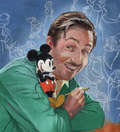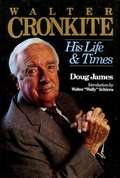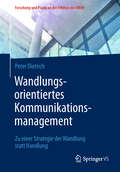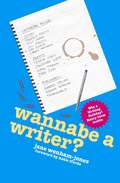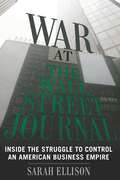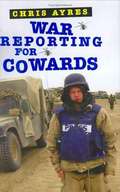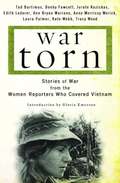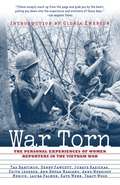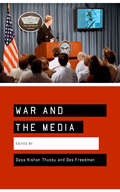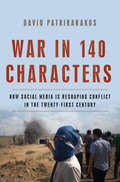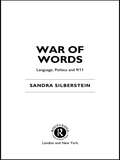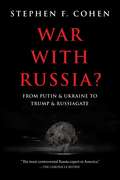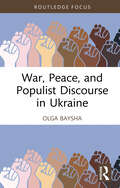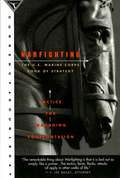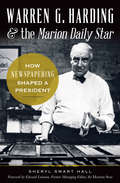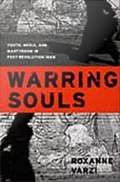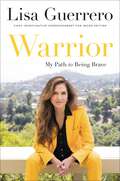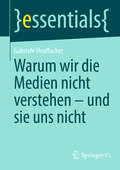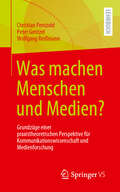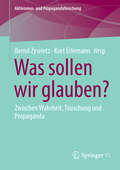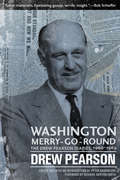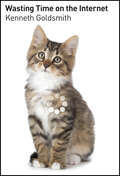- Table View
- List View
Walt's Imagination: The Life of Walt Disney (Big Words #10)
by Doreen RappaportWalt Disney's name is synonymous with family entertainment. Mickey Mouse, Snow White and the Seven Dwarfs, Bambi, Disneyland, and numerous other creations have inspired generations of children the world over. From his childhood in rural Missouri to his legendary stature as a film and television icon, Walt governed his life with imagination, ingenuity, and scrupulous attention to detail. Faced with both public failures and massive success, he revolutionized the art form of animation, always seeking innovative solutions, cutting edge technology, and new ways of storytelling. Devoted to perfection, Walt was not always easy to work with, but no one can deny his profound talent and impact. Charting Walt's progression from farm boy to actor to artist, animator, director, and entertainment celebrity, Walt's own words are presented and contextualized within Doreen Rappaport's signature compelling prose. Illustrated with vivid authenticity by animator/painter John Pomeroy, this stunning entry in the award-winning Big Words series reveals a man of deep and varied passions with a constantly evolving vision, and a storyteller above all.
Walter Cronkite: His Life and Times
by Doug JamesWalter Cronkite: His Life and Times traces the Dean of Newscasters through his incredible 41-year career—political conventions, wars, the Watergate years, selection of his successor, as well as glimpses into his personal life. <p><p> Walter Cronkite grew up with radio and worked briefly in that medium before distinguishing himself as a United Press correspondent during World War II. <p> His television career predated the "Golden Age" of television by two years. From 1950, when he joined a CBS affiliate in Washington, D.C., until his retirement in 1981, Cronkite literally helped invent television newscasting. <p> Cronkite's ability to cover world news without himself becoming part of the news was unique. His reputation for near total objectivity was phenomenal. Hailed by his peers, viewers and world leaders, Cronkite steadfastly refused to allow his notoriety to interfere with his ability to deliver the news of the day. <p> Cronkite was known as a "news junkie" by his family and friends and a taskmaster by his subordinates. As he demanded the best from his news team, he expected even more from himself as managing editor of the CBS Evening News. <p> His devotion to his profession earned him 11 Emmys and the unprecedented honor of being named the "most trusted man in America."
Walter Lippmann: Public Economist
by Craufurd D. GoodwinUnemployment, monetary and fiscal policy, and the merits and drawbacks of free markets were a few of the issues the journalist and public philosopher Walter Lippmann explained to the public during the Depression, when professional economists skilled at translating concepts for a lay audience were not yet on the scene, as Craufurd Goodwin shows.
Wandlungsorientiertes Kommunikationsmanagement: Zu Einer Strategie Der Wandlung Statt Handlung (Forschung und Praxis an der FHWien der WKW)
by Peter DietrichUnser Verständnis von Kommunikationsmanagement ist stark instrumentell geprägt. Diesem Modus der Weltbeherrschung wird in diesem Buch die chinesisch inspirierte Idee der Weltanpassung gegenübergestellt. Statt der vom definierten Ziel rückwärts gedachten Planung und Umsetzung einer idealen Strategie, wird ausgehend vom aktuellen Situationspotential ein vorwärtsorientierter Managementmodus vorgeschlagen. Dieser Modus realisiert sich nicht über aktivistische Handlungen, sondern über diskrete und indirekte Wandlungen.Im Zentrum des wandlungsorientierten Kommunikationsmanagements stehen die Identifikation und Berücksichtigung der Sinn- und Bedeutungsstrukturen von fünf unterschiedlichen Lebenswelten. Deren prägende Frames und Narrative werden detailliert herausgearbeitet und bieten konkrete Ansatzpunkte für die Umsetzung in allen Phasen des wandlungsorientierten Kommunikationsmanagements – von der Analyse, über die Strategieentwicklung bis hin zur Operationalisierung.
Wannabe a Writer?
by Jane Wenham-JonesWannabe a Writer? This hilarious, informative guide to getting into print, is a must-have for anyone who's ever thought they've got a book in them.Foreword by KATIE FFORDEContributors include:Writers: Frederick Forsyth, Ian Rankin, Jilly Cooper & Jill Mansell Publishers: Harper Collins, Hodder Headline, Simon & Schuster Journalists: Miles Kington, Michael Bywater, Robert Crampton Agents: Teresa Chris, Simon Trewin, Jonathan Lloyd & Jane JuddWannabe a Writer? This hilarious, informative guide to getting into print, is a must-have for anyone who's ever thought they've got a book in them.* Where do you start? * How do you finish? * And will anyone ever publish it when you have?Drawing on her own experiences as a novelist and journalist, Writing Magazine's Agony Aunt Jane Wenham-Jones takes you through the minefield of the writing process, giving advice on everything from how to avoid Writer's Bottom to what to wear to your launch party.Including hot tips from authors, agents and publishers at the sharp end of the industry, Wannabe a Writer? tells you everything you ever wanted to know about the book world - and a few things you didn't...Follow Kate's writing tips on My Weekly: https://www.myweekly.co.uk/2020/08/17/do-you-want-to-write-a-novel/
War At The Wall Street Journal: Inside the Struggle To Control an American Business Empire
by Sarah EllisonA tale about big business, an imploding dynasty, a mogul at war, and a deal that epitomized an era of change While working at the Wall Street Journal, Sarah Ellison won praise for covering the $5 billion acquisition that transformed the pride of Dow Jones and the estimable but eccentric Bancroft family into the jewel of Rupert Murdoch’s kingdom. Here she expands that story, using her knowledge of the paper and its people to go deep inside the landmark transaction, as no outsider has or can, and also far beyond it, into the rocky transition when Murdoch’s crew tussled with old Journal hands and geared up for battle with the New York Times. With access to all the players, Ellison moves from newsrooms to estates and shows Murdoch, finally, for who he is—maneuvering, firing, undoing all that the Bancrofts had protected. Her superlative account transforms news of the deal into a timeless chronicle of American life and power.
War Made Easy: How Presidents and Pundits Keep Spinning Us to Death
by Norman Solomonin this provocative book, Norman solomon presents compelling arguments for how American politicians and the political and military establishment use the mass media as propaganda vehicles to promote military action. Using examples from Republican and Democratic administrations, solomon shows how the same themes are used over and over again to promote going to war and to muzzle critics.
War Reporting for Cowards
by Chris AyresFrom the book: "Captain," I called out. -How dangerous is this going to be?" "Don't worry," he said with a straight face. "People think artillery is boring. But we kill more people than anyone else." Chris Ayres never wanted to be a war correspondent. A small-town boy, a hypochondriac, and a neat freak with an anxiety disorder, he saw journalism as a ticket to lounging by swimming pools in Beverly Hills and sipping martinis at Hollywood celebrity parties. Instead, he keeps finding himself in the wrong place at the wrong time, whether it's a few blocks from the World Trade Center on September 11 or one cubicle over from an anthrax attack at The New York Post. Then, a misunderstanding with his boss sees him transferred from Hollywood to the Middle East, where he is embedded with the Marine Corps on the front line of the Iraq War, headed straight to Baghdad with a super-absorbent camping towel, an electric toothbrush, and only one change of underwear. What follows is the worst (not to mention the first) camping trip of his life. War Reporting for Cowards is the Iraq War through the eyes of a "war virgin." After a crash course on "surviving dangerous countries" where he nearly passes out when learning how to apply a tourniquet, and a gas mask training exercise where he is repeatedly told he is "one very dead media representative," Ayres joins the Long Distance Death Dealers, a battalion of gung-ho Marines who kill more people on the battlefield than anyone else. Donning a bright blue flak jacket and helmet, he quickly makes himself the easiest target in the entire Iraqi desert. Ayres spends the invasion digging "coffin-sized" foxholes, dodging incoming mortars, fumbling for his gas mask, and, at one point, accidentally running into the path of a dozen Republican Guard tanks amid a blinding mud storm. By "bogged down" by the growing insurgency, Ayres realizes not only what the sheer terror of combat feels like, but also the visceral thrill of having won a fight for survival. In the tradition of M*A*S*H and Catch-22, War Reporting for Cowards is by turns extraordinarily honest, heartfelt, and bitterly hilarious. It is destined to become a classic of war reportage.
War Torn
by Tad Bartimus Denby Fawcett Jurate Kazickas Edith Lederer Ann MarianoFor the first time, nine women who made journalism history talk candidly about their professional and deeply personal experiences as young reporters who lived, worked, and loved surrounded by war. Their stories span a decade of America's involvement in Vietnam, from the earliest days of the conflict until the last U.S. helicopters left Saigon in 1975. They were gutsy risk-takers who saw firsthand what most Americans knew only from their morning newspapers or the evening news. Many had very particular reasons for going to Vietnam--some had to fight and plead to go--but others ended up there by accident. What happened to them was remarkable and important by any standard. Their lives became exciting beyond anything they had ever imagined, and the experience never left them. It was dangerous--one was wounded, and one was captured by the North Vietnamese--but the challenges they faced were uniquely rewarding.They lived at full tilt, making an impact on all the people around them, from the orphan children in the streets to their fellow journalists and photographers to the soldiers they met and lived with in the field. They experienced anguish and heartbreak--and an abundance of friendship and love. These stories not only introduce a remarkable group of individuals but give an entirely new perspective on the most controversial conflict in our history. Vietnam changed their lives forever. Here they tell about it with all the candor, commitment, and energy that characterized their courageous reporting during the war.From the Hardcover edition.
War Torn: The Personal Experiences of Women Reporters in the Vietnam War
by Laura Palmer Tad Bartimus Denby Fawcett Jurate Kazickas Edith Lederer Ann Mariano Anne Morrissy Merick Kate Webb Tracy WoodThis book is about our experiences as women reporters covering the Vietnam War from 1966 until the fall of Saigon in 1975. Each of us has written a chapter about what we saw and felt in Indochina--our adventures, fears, excitement, and the difficulties and loneliness. Vietnam was a unique war for all journalists, because there was no censorship. The U.S. military provided extraordinary access to combat operations. We could fly on bombing missions, parachute into hostile territory with an airborne unit, spend a week with the Special Forces in the jungle, hitch a ride on a chopper and land amid rocket and artillery as a battle raged, or be taken prisoner like a soldier. This access gave women reporters a chance to show that they could cover combat bravely and honorably, holding their own even under the most frightening and stressful circumstances.
War and the Media: Reporting Conflict 24/7
by Des Freedman Daya Kishan Thussu`No book is more timely than this collection, which analyses brilliantly the Western media's relentless absorption into the designs of dominant, rapacious power' - John Pilger `A most timely book, with many valuable insights' - Martin Bell O.B.E `It has long been known that the outcome of war is deeply influenced by the battle to win 'hearts and minds'. This book provides a stimulating set of perspectives which combine the analyses of prominent academics with the experiences of leading journalists' - Professor Tom Woodhouse, University of Bradford `This volume represents an all-star cast of authors who have a tremendous amount of knowledge about media and world conflict. One of its strengths is that it doesn't focus entirely narrowly on media, but puts the discussion of media issues in the context of changes in the world order in military doctrine' - Professor Daniel C. Hallin, University of California `This book comes just in time. A coherent and wide-ranging collection of data, analyses and insights that help our understanding of the complex interaction between communication and conflict. A major intellectual contribution to critical thinking about the early 21st century' - Cees J Hamelink, Professor International Communication, University of Amsterdam With what new tools do governments manage the news in order to prepare us for conflict? Are the media responsible for turning conflict into infotainment? Is reporting gender specific? How do journalists view their role in covering distant wars? This book critically examines the changing contours of media coverage of war and considers the complexity of the relationship between mass media and governments in wartime. Assessing how far the political, cultural and professional contexts of media coverage have been affected by 9/11 and its aftermath, the volume also explores media representations of the `War on Terrorism' from regional and international perspectives, including new actors such as the Qatar-based Al-Jazeera - the pan-Arabic television network. One key theme of the book is how new information and communication technologies are influencing the production, distribution and reception of media messages. In an age of instant global communication and round-the-clock news, powerful governments have refined their public relations machinery, particularly in the way warfare is covered on television, to market their version of events effectively to their domestic as well as international viewing public. Transnational in its intellectual scope and in perspectives, War and the Media includes essays from internationally known academics along with contributions from media professionals working for leading broadcasters such as BBC World and CNN.
War in 140 Characters: How Social Media Is Reshaping Conflict in the Twenty-First Century
by David PatrikarakosA leading foreign correspondent looks at how social media has transformed the modern battlefield, and how wars are fought Modern warfare is a war of narratives, where bullets are fired both physically and virtually. Whether you are a president or a terrorist, if you don't understand how to deploy the power of social media effectively you may win the odd battle but you will lose a twenty-first century war. Here, journalist David Patrikarakos draws on unprecedented access to key players to provide a new narrative for modern warfare. He travels thousands of miles across continents to meet a de-radicalized female member of ISIS recruited via Skype, a liberal Russian in Siberia who takes a job manufacturing "Ukrainian" news, and many others to explore the way social media has transformed the way we fight, win, and consume wars-and what this means for the world going forward.
War of Words: Language, Politics and 9/11
by Sandra SilbersteinIn a media age, wars are waged not only with bombs and planes but also with video and sound bites. War of Words is an incisive report from the linguistic battlefields, probing the tales told about September 11th to show how Americans created consensus in the face of terror. Capturing the campaigns for America's hearts, minds, wallets and votes, Silberstein traces the key cultural conflicts that surfaced after the attacks and beyond: the attacks on critical intellectuals for their perceived 'blame America first' attitude the symbiotic relationship between terrorists and the media (mis)representations of Al Qaeda and the Taliban used to justify military action the commercialisation of September 11th news as 'entertainment' when covering tragic events. Now featuring a new chapter on the Second Anniversary and Beyond, including: the war in Iraq, the backlash against former 'heroes' and accusations of presidential mendacity.A perceptive and disturbing account, War of Words reveals the role of the media in manufacturing events and illuminates the shifting sands of American collective identity in the post September 11th world.
War with Russia: From Putin & Ukraine to Trump & Russiagate
by Stephen F. CohenAre we in a new Cold War with Russia? How does a new Cold War affect the safety and security of the United States? Does Vladimir Putin really want to destabilize the West?America is in a new Cold War with Russia even more dangerous than the one the world barely survived in the twentieth century. The Soviet Union is gone, but the two nuclear superpowers are again locked in political and military confrontations, now from Ukraine to Syria. All of this is exacerbated by Washington’s war-like demonizing of the Kremlin leadership and by Russiagate’s unprecedented allegations. US mainstream media accounts are highly selective and seriously misleading. American “disinformation,” not only Russian, is a growing peril. In War With Russia?, Stephen F. Cohen—the widely acclaimed historian of Soviet and post-Soviet Russia—gives readers a very different, dissenting narrative of this more dangerous new Cold War from its origins in the 1990s, the actual role of Vladimir Putin, and the 2014 Ukrainian crisis to Donald Trump’s election and today’s unprecedented Russiagate allegations. Cohen’s views have made him, it is said, “America’s most controversial Russia expert.” Some say this to denounce him, others to laud him as a bold, highly informed critic of US policies and the dangers they have helped to create.War With Russia? gives readers a chance to decide for themselves who is right: are we living, as Cohen argues, in a time of unprecedented perils at home and abroad?
War, Peace, and Populist Discourse in Ukraine (Routledge Focus on Communication Studies)
by Olga BayshaThis book explores the detrimental effects on global peace of populism’s tendency to present complex social issues in simplistic "good versus evil" terms. Analyzing the civilizational discourse of Ukrainian President Volodymyr Zelensky with respect to the ongoing war between Russia and Ukraine—with his division of the world into "civilized us" versus "barbarian them"—the book argues that such a one-dimensional representation of complex social reality leaves no space for understanding the conflict and has little, if any, potential to bring about peace.To deconstruct the "civilization versus barbarism" discourse propagated by Zelensky, the book incorporates into its analysis alternative articulations of the crisis by oppositional voices. The author looks at the writing of several popular Ukrainian journalists and bloggers who have been excluded from the field of political representation within Ukraine, where all oppositional media are currently banned. Drawing on the discourse theory of Ernesto Laclau and Chantal Mouffe, the author argues that the incorporation of alternative perspectives, and silenced voices, is vitally important for understanding the complexity of all international conflicts, including the current one between Russia and Ukraine.This timely and important study will be relevant for all students and scholars of media and communication studies, populist rhetoric, political communication, journalism, area studies, international relations, linguistics, discourse analysis, propaganda, and peace studies.
Warfighting
by A. M. GrayWarfighting is an authentic American philosophy of action that will thrill the millions of fans of SunTzu's The Art of War and Musashi's T he Book of Five Rings. This modern classic of strategy and philosophy is the quintessential guide to prevailing in competitive situations, be it war, work, play, or daily living.Sometimes life is war and sometimes business is war and sometimes you need to call in the Marines. Over the past two hundred years, the Marines have developed a reputation for getting the job done-fearlessly, boldly, and taking no prisoners. What better role model for the hidden warriors in ourselves? What better advice to call on when the stakes are high and sensitivity just isn't going to work? Written in 1989 as a philosophical and strategic guide-book for the US. Marine Corps, Warfighting is a worthy successor to SunTzu's The Art Of War. With clarity, brevity, and wisdom, it describes the basic forces at work in every competitive situation whether on the field of battle, in the boardroom, or in the courtroom. With twentieth-century technology and its emphasis on speed and versatility, the rules of war and competition have changed. Warfighting's exploration of maneuver warfare takes readers beyond Sun Tzu's classic lessons and provides them a more thorough understanding of what it takes to fight and win in the modern world. Currency's edition of Warfighting features interviews with famous former Marines including F. Lee Bailey, Ed McMahon, and Donald Regan. They tell how they have used the Marine Corps' battle strategies of strength and straightforwardness as their secret weapons in every confrontation, whether at a corporate, departmental. or personal level.
Warren G. Harding & the Marion Daily Star: How Newspapering Shaped a President
by Sheryl Smart HallHow a committed journalist transformed a small town daily newspaper—and how that editorial success inspired his policies as President of the United States. President Warren G. Harding&’s thirty-nine-year career as a newspaperman is often treated as a footnote. This book offers a unique approach to the Harding story, presenting him as he saw himself: as a newspaperman. His political successes were based on the thinking of a newspaper editor—balancing all of the facets of an issue, examining the facts and weighing the effect on the constituents. Even his approach to balancing the federal budget was built on early experience at his small, struggling newspaper, where his motto was: &“All paid in, all paid out, books even.&” The only member of the Fourth Estate to enter the White House, Harding found his voice through the pages of the Marion Daily Star. Author Sheryl Smart Hall offers an intimate view of the man, often as seen through the eyes of those who knew him best—his co-workers at the Star. Includes photos
Warriner's English Grammar and Composition Liberty Edition, First Course
by John E. WarrinerThis textbook will be a valuable aid in your study of English. In it you will find an explanation of how the language works, which is something you need to understand if you are to learn to express yourself correctly and effectively. You will find exercises and writing assignments that you need for practice. The book will teach you the difference between an effective sentence and an ineffective one, between strong writing and weak writing. You will learn to express yourself in correct, clear and interesting English.
Warring Souls: Youth, Media, and Martyrdom in Post-Revolution Iran
by Roxanne VarziWith the first Fulbright grant for research in Iran to be awarded since the Iranian revolution in 1979, Roxanne Varzi returned to the country her family left before the Iran-Iraq war. Drawing on ethnographic research she conducted in Tehran between 1991 and 2000, she provides an eloquent account of the beliefs and experiences of young, middle-class, urban Iranians. As the first generation to have come of age entirely in the period since the founding of the Islamic Republic of Iran, twenty-something Iranians comprise a vital index of the success of the nation's Islamic Revolution. Varzi describes how, since 1979, the Iranian state has attempted to produce and enforce an Islamic public sphere by governing behavior and by manipulating images--particularly images related to religious martyrdom and the bloody war with Iraq during the 1980s--through films, murals, and television shows. Yet many of the young Iranians Varzi studied quietly resist the government's conflation of religious faith and political identity. Highlighting trends that belie the government's claim that Islamic values have taken hold--including rising rates of suicide, drug use, and sex outside of marriage--Varzi argues that by concentrating on images and the performance of proper behavior, the government's campaign to produce model Islamic citizens has affected only the appearance of religious orthodoxy, and that the strictly religious public sphere is partly a mirage masking a profound crisis of faith among many Iranians. Warring Souls is a powerful account of contemporary Iran made more vivid by Varzi's inclusion of excerpts from the diaries she maintained during her research and from journal entries written by Iranian university students with whom she formed a study group.
Warrior: My Path to Being Brave
by Lisa GuerreroLisa Guerrero chronicles her iconic career—from dealing with harassment as a sports broadcaster to chasing &“bad guys&” for Inside Edition—and proves that through small, daily acts, bravery is a muscle we can strengthen over time.I&’ve been a cheerleader. A corporate executive. A Barbie Doll. A sportscaster. A soap opera vixen. A sideline reporter. A Playboy cover model. A Diamond Diva. A red-carpet correspondent. An investigative journalist. A disrupter. I made Dennis Rodman cry. I&’ve interviewed three presidents and hundreds of athletes. I costarred in a viral video that has one billion views. I sued the New England Patriots--and won. I tracked down a murderer. I was hit by a car. I butted heads with Barbara Walters. I even played myself in a movie starring Brad Pitt. During her career in sports broadcasting, Guerrero covered Super Bowls, Worlds Series, NBA Finals, and interviewed sports superstars. From the outside it seemed glamourous, but often she was miserable, told to smile more, argue less, and show a lot of leg and cleavage. Colleagues would joke—sometimes on national TV—that she clinched big interviews because of sexual acts rather than talent. She made a mistake on air during the opening game on Monday Night Football that cost her her sportscasting career... and almost her life. Fast forward a few years, and Guerrero has achieved phenomenal success as Inside Edition's Chief Investigative Correspondent. Her stories have led to arrests, changed federal legislation and policies at Fortune 500 companies, and helped shine a light on crime, scams, child abuse, and even cold case murders. And in the last decade alone, she has won over thirty-five national journalism honors and awards. Today, Guerrero is bombarded with emails and direct messages from people of every generation who all want to know the same thing: &“How are you so brave? How can I be brave too?&” Women dealing with husbands, friends, in-laws, co-workers, and bosses ask for the courage to request raises, be taken seriously at meetings, and stand up to abusive spouses. Teens and pre-teens ask for advice on dealing with bullies, teachers, and parents. Warrior—filled with the incisive stories of failure, struggles, challenges, perseverance, and finally, success—is her answer.
Warum wir die Medien nicht verstehen - und sie uns nicht (essentials)
by Gabriele HooffackerWarum berichten Medien über manche Themen und über manche nicht? Warum missfallen uns manche Nachrichten und erst recht manche Kommentare? Was führt zu Verzerrungen der Wahrnehmung beim Publikum - und auch bei Journalistinnen und Journalisten? Der Band bietet Wissenswertes aus Redaktionen und Journalismus-Ausbildung und gibt Einblicke in die Wahrnehmungspsychologie, etwa den Hostile Media Effekt oder den Third-Person- Effect. Ziel ist, fundierte Medienkritik zu ermöglichen.
Was machen Menschen und Medien?: Grundzüge einer praxistheoretischen Perspektive für Kommunikationswissenschaft und Medienforschung
by Wolfgang Reißmann Christian Pentzold Peter GentzelDie Rede von Praktiken ist in der Kommunikations- und Medienwissenschaft weit verbreitet. Eine systematische Diskussion des Potenzials praxistheoretischer Denk- und Forschungsansätze steht dagegen noch aus. Dieses Buch ist eine Einladung zur tieferen Beschäftigung mit Medienpraktiken und wirbt für eine entsprechende Neuorientierung von Kommunikationsforschung und Medienanalyse. Dazu wird der Status quo praxistheoretischer Ansätze in der Kommunikations- und Medienwissenschaft kompakt vorgestellt. Interessierte bekommen einen Einstieg und Expert:innen werden Anschlussmöglichkeiten angeboten. Es geht sowohl um Grundprinzipien praxistheoretischen Denkens als auch um die sich daraus ergebenden Haltungen sowie um Zugänge für praktische Untersuchungen. Im Zentrum stehen aktuelle Herausforderungen und die Möglichkeiten, Praktiken in Digitalmedien und vernetzten Medienumgebungen zu analysieren.
Was sollen wir glauben?: Zwischen Wahrheit, Täuschung und Propaganda (Aktivismus- und Propagandaforschung)
by Bernd Zywietz Kurt ErlemannPropaganda menschenfeindlicher Extremist*innen, grassierende Fake News, populistische Verschwörungsmythen oder ausländische Desinformationskampagnen: Die Wahrheit scheint in Gefahr, vor allem im Internet, und mit ihr die Demokratie und der öffentliche Zusammenhalt der Gesellschaft. Schließlich braucht es eine gemeinsame Faktenbasis, von der aus Konflikte gelöst, widerstreitende Interessen ausgehandelt und unterschiedliche Sichtweisen zusammengebracht werden. Dafür wird auf nachträgliche („Debunking") oder vorauseilende Aufklärung („Prebunking") gesetzt, auf die Förderung von Informationskompetenz oder das Nachprüfen bei verlässlichen Quellen angemahnt. Zwischen reinen Fakten und 'der Wahrheit' einerseits, Lüge und Täuschung andererseits gibt es jedoch viele Grauzonen. Das meint nicht nur die selten klare Trennbarkeit von Tatsachen und Meinungen: Die Beiträge des Bandes befassen sich u. a. mit dem komplizierten Verhältnis von Wahrheit und Propaganda, mit Formen und gemeinschaftsbildenden Funktionen von Unwahrheit in Sozialen Medien sowie mit textpragmatischen und rhetorischen Aspekten, die uns für Misinformationen oder Falschmeldungen anfällig machen. Doch auch dass und wie Wahrheit jenseits von Faktizität und Faktualität – so im journalistischen Erzählen oder in Gleichnissen – vermittelt wird und welche Ähnlichkeiten wie essenziellen Unterschiede sich darin gegenüber "alternativen Fakten", Desinformation und Verschwörungsmythen zeigen, ist Thema.
Washington Merry-Go-Round: The Drew Pearson Diaries, 1960-1969
by Richard Norton Smith Peter Hannaford Drew PearsonFor most of three decades, Drew Pearson was the most well-known journalist in the United States. In his daily newspaper column—the most widely syndicated in the nation—and on radio and television broadcasts, he chronicled the political and public policy news of the nation. At the same time, he worked his way into the inner circles of policy makers in the White House and Congress, lobbying for issues he believed would promote better government and world peace. Pearson, however, still found time to record his thoughts and observations in his personal diary. Published here for the first time, Washington Merry-Go-Round presents Pearson’s private impressions of life inside the Beltway from 1960 to 1969, revealing how he held the confidence of presidents—especially Lyndon B. Johnson—congressional leaders, media moguls, political insiders, and dozens of otherwise unknown sources of information. His direct interactions with the DC glitterati, including Bobby Kennedy and Douglas MacArthur, are featured throughout his diary, drawing the reader into the compelling political intrigues of 1960s Washington and providing the mysterious backstory on the famous and the notorious of the era.
Wasting Time on the Internet
by Kenneth GoldsmithUsing clear, readable prose, conceptual artist and poet Kenneth Goldsmith’s manifesto shows how our time on the internet is not really wasted but is quite productive and creative as he puts the experience in its proper theoretical and philosophical context.Kenneth Goldsmith wants you to rethink the internet. Many people feel guilty after spending hours watching cat videos or clicking link after link after link. But Goldsmith sees that “wasted” time differently. Unlike old media, the internet demands active engagement—and it’s actually making us more social, more creative, even more productive.When Goldsmith, a renowned conceptual artist and poet, introduced a class at the University of Pennsylvania called “Wasting Time on the Internet”, he nearly broke the internet. The New Yorker, the Atlantic, the Washington Post, Slate, Vice, Time, CNN, the Telegraph, and many more, ran articles expressing their shock, dismay, and, ultimately, their curiosity. Goldsmith’s ideas struck a nerve, because they are brilliantly subversive—and endlessly shareable.In Wasting Time on the Internet, Goldsmith expands upon his provocative insights, contending that our digital lives are remaking human experience. When we’re “wasting time,” we’re actually creating a culture of collaboration. We’re reading and writing more—and quite differently. And we’re turning concepts of authority and authenticity upside-down. The internet puts us in a state between deep focus and subconscious flow, a state that Goldsmith argues is ideal for creativity. Where that creativity takes us will be one of the stories of the twenty-first century.Wide-ranging, counterintuitive, engrossing, unpredictable—like the internet itself—Wasting Time on the Internet is the manifesto you didn’t know you needed.
